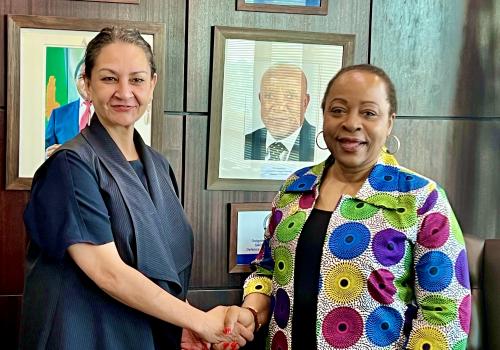Ms. Angele Makombo N’Tumba, Deputy Executive Secretary for Regional Integration of the Southern African Development Community (SADC), and the newly appointed, Climate Crisis Coordinator for the El Niño/La Niña Response at the United Nations Office for the Coordination of Humanitarian Affairs (UNOCHA), Ms. Reena Ghelani expressed their shared commitment to enhance coordinated efforts in addressing the humanitarian impacts of the climate crisis and El Niño in the region. The meeting took place on 21stFebruary 2024, at the SADC Secretariat Head Offices in Gaborone, Botswana.
Ms. Reena Ghelani was appointed to her new role effective 15 January 2024 by the United Nations Under-Secretary General for Humanitarian Affairs and Emergency Relief Coordinator.
The purpose of the meeting was to discuss the climate crisis in the region and its impacts as well as the potential regional humanitarian response. Both parties aimed to explore effective and coordinated strategies to mitigate the humanitarian impacts of the climate crisis and resultant El Niño and La Niña, which continue to detrimentally affect livelihoods, reverse development gains and compromise the overall quality of life in the region.
UNOCHA aims to strengthen the international response to complex emergencies and natural disasters, and assists in coordinating humanitarian appeals and addressing the needs of countries in crises by analysing and understanding their requirements, as well as mobilising assistance.
Ms Ghelani indicated that UNOCHA will to facilitate the exploration of strategies to bridge the divide between humanitarian efforts and developmental activities and advocate for improved access to climate financing in the SADC region.
Ms. Ghelani commended the region's remarkable efforts in monitoring and evaluating the impacts of El Niño, as well as in developing regional contingency plans and early warning systems. She urged the region to invest further in renewable energy and long-term preventative measures against El Niño, while emphasising the significance of building sustainable and resilient strategies.
Ms. Ghelani also highlighted that UNOCHA is closely monitoring the El Niño situation and bridging the gap between humanitarian and development work. She emphasised the need for collaboration among the parties involved, to exchange valuable experiences in disaster mitigation, explore new learning opportunities, and enhance emergency response mechanisms and training programmes.
Ms. Makombo N’Tumba highlighted the vulnerability of the SADC region to disasters due to the challenges presented by El Niño and climate change in several member states. She drew attention to reports detailing humanitarian crises, such as severe and intense heatwaves, cyclones, wildfires, floods, droughts, erratic rains, and health epidemics.
Ms. Makombo N’Tumba urged UNOCHA to collaborate closely with the region, particularly on evidence generation as the impacts of El Niño are expected to escalate humanitarian needs and place additional strain on food security and public health. Additionally, Ms. Makombo N’Tumba expressed the SADC Secretariat's unwavering commitment to enhancing humanitarian support, including strengthening regional coordination capacity in disaster response, providing training to regional stakeholders on humanitarian response and coordination, and facilitating El Niño preparedness and response.
Both parties emphasised the importance of renewing the Memorandum of Understanding (MoU) that was signed between the two parties in 2014 which establishes a firm foundation for streamlining efforts and ensuring an effective response to disasters in the region through efficient disaster risk management and humanitarian assistance initiatives.
In addition to various initiatives, SADC and UNOCHA are strategic partners on the Disaster Risk Management Strengthening in Southern Africa (DRMSS) Project, funded by the European Union (EU). This project plays a crucial role in reducing the impacts of both natural and man-made hazards, strengthening disaster risk management and preparedness capacity, and enhancing resilience.

